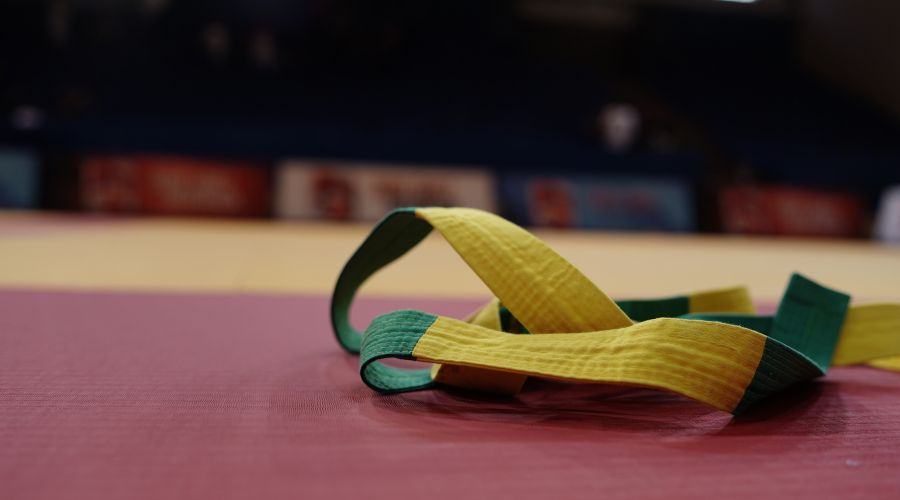Few things in life are as nerve-racking as competing in combat sports. However, the rewards of personal achievement cannot be overstated, so people continue to overcome their fears and step on the mats to compete. While the ultimate price is not tangible, winning a gold medal makes everything so much sweeter. But how do you win a BJJ tournament?
Training BJJ consistently and developing the physical and mental skills required to overcome other competitors is the first and obvious answer. But other steps can drastically tip the scales in your favor in competitions, like having a game plan, developing a winner’s mindset, and making all the necessary preparations.
Doing a few key things is often the difference between winning and losing. If two equally skilled competitors meet, the one with the game plan will win most encounters, but other elements can increase the likelihood of getting the gold medal. Do you know what they are?
How To Win A BJJ Tournament
Winning a jiu-jitsu tournament requires physical and mental skills and a well-thought-out game plan. Not always the best grappler wins the tournament; a lot of it comes down to mindset, preparation, and proper execution of the game plan. This is why there are many things you can do aside from training diligently to increase your chance of winning.
Some advice will be universal for all levels; others will be geared toward beginners and people with less competition experience. Those with a wealth of experience already have a framework to rely upon, but I am sure they will also find valuable information to implement.
Know The Rules
Like any sport, the rules are crucial to how it’s played. Jiu-jitsu is a tightly regulated sport, and there are A LOT of rules. The IBJJF especially has tons of regulations, not only during the match but also for the attire, behavior, and so on. If you get disqualified, you are certainly not winning the tournament, even if you are much better than anyone else.
Then, if you are into no-gi, things are even more complicated. Each organization has slightly different rules about scoring, banned techniques, match length, etc.
Always take the time to learn the rules you will be competing under and prepare specifically for them. The worst feeling is to lose by disqualification for some rule you didn’t know about.
The rules also include how the tournament works in general. Is it a direct elimination, a round-robin, a double elimination, or another format? Knowing all of the details beforehand makes preparation much more focused.
Weight Management

Weight divisions exist to ensure fair and competitive matches, but choosing which division to compete in can be challenging. You need to be sure your weight will be on point on the scale, or you won’t be allowed to compete.
Weight-cutting is a complex topic. It provides an advantage for the heavier athlete at the higher levels, but water weight cutting is complex and can badly backfire.
A bad weight cut will leave you drained even before you’ve slapped hands with your opponent, so you either need to cut weight properly or not do it all.
For beginners, you should compete closer to your natural weight. If you need to lose 6 lbs in 4 weeks, you can do it safely by losing fat. But if you need to lose 6 pounds in a week, you are in for a hell of a week.
For your first couple of tournaments, worrying about your weight and everything else adds unnecessary pressure to an already overwhelmed mind.
Gameplan
In my opinion, one of the most critical aspects of winning a tournament is having a game plan, and this goes for each experience level, from fresh white belts to elite black belts. Too often, people enter and go with the flow. This may be great in practice, but it’s not the way to win matches.
This does not mean you will have a script. A BJJ match is chaotic, and everything can and will happen. A game plan is a flowchart of possible scenarios and answers for each.
The more advanced your skills are, the more options you will have in your toolbox, and the more elaborate the plan will be.
For example, let’s form a basic white/blue belt game plan. A good gameplan has three pillars:
- Top game
- Bottom game
- Escapes linking to the other two
Pillar A of the flow chart can look like this: The match starts at the feet, and you want to take it to the ground. You know you have a good single-leg takedown and body lock, so you only use those.
When you take the opponent down, there will be new options depending on where you land. Detail the guard passing method you will use, and for the finish, have a couple of reliable submissions for each position.
The other side of the flowchart includes what will happen if the opponent manages to take you down. How will you reverse or sweep, and what techniques will you use if you want to attack from the bottom?
If you manage to return to the top position, you connect to the top game flow chart.
The whole chart should be filled with specific takedowns, passes, sweeps, reversals, and submissions, not just broad concepts.
A game plan will eliminate hesitation, unnecessary decision-making, and nerves. It will also help you adjust easier and always have a core set of moves to fall back upon.
The game plan should also be in congruence with the ruleset. Know how each position scores and keep it for the required time. Focus on positions and things that score higher under the specific rules.
Mental Exercises

Mental exercises are often recommended but rarely used in reality. This is different for high-level competitors, though, who always use visualizations and meditations, and so should we.
Visualization is extremely powerful; like everything else, it is a skill you can improve at. Sit comfortably, close your eyes, and envision how your game plan plays out. Entertain all the scenarios and imagine yourself winning the match and the whole tournament. Do this often and with focus.
Mindfulness meditations and affirmations are potent ways to rewire your brain for victory. Convince yourself you are going to win the whole thing. When the brain comes up with excuses for why you will lose, find counterarguments for why you will win.
The topic of mental preparation is extremely deep, and I urge everyone to examine and apply sports psychology or other forms of controlling one’s own mind to enhance performance. All the best are doing it, and you should, too.
Rest, Nutrition, and Tournament Checklist
For the last days before the competition, it’s best to scale down the training, let the body recover to full health, and be prepared for the real deal.
Also, do what you can to be well-slept and rested on the day of the tournament, although there are often roadblocks to doing so, like travel, schedule, and, most of all, nerves.
The nutrition in the last couple of days is also crucial for your energy levels on game day. Different bodies react differently to various foods, so there isn’t a one-fits-all solution, but specific advice I can give you is:
- Don’t overeat
- Avoid spicy foods
- Don’t overeat sugary treats, or you will get an energy slump
- Always have ample water with you
And finally, make sure you have all your gear with you. Prepare it in advance and check it a couple of times. Missing your mouthpiece or something else will add stress and may even make you unable to participate in the tournament. Make a checklist with the necessary stuff.
- Gi or no-gi outfit legal for the organization
- Spare clothing
- Mouthguard
- Water and snack
- Anything else you feel you need to have (headphones, lucky charms, etc.)
Summary
This list is not exhaustive; some people need extra steps and methods to win. Others come back with medals without much deliberate thought or preparation outside of regular training, but I can assure you they are the exception rather than the norm.
You can never be 100% ready for a competition or be certain you will win. But the gold medal will be much closer if you take the extra steps and invest time in devising a game plan, visualizing, forging a strong mindset, and optimizing your rest and nutrition.
